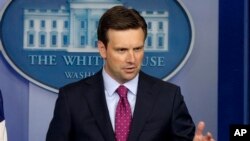WHITE HOUSE —
President Barack Obama held a Cabinet-level meeting Tuesday as part of an ongoing review of U.S. aid to Egypt. White House officials are considering possible responses to the Egyptian interim government’s violent crackdown on protesters.
White House spokesman Josh Earnest had confirmed to reporters Tuesday that the meeting would take place, but he downplayed its significance.
“These kinds of national security meetings are not uncommon. The president does chair them on a pretty regular basis, and I am sure it is not even the first one they have had on this topic. At this point, I would not anticipate any major announcements related to our aid and assistance in the immediate aftermath of this meeting,” he said.
Earnest denied media reports that the administration has decided to cut off some or all U.S. aid to Egypt. He said the White House review of its policy continues.
“That review that the president ordered in early July has not concluded. And published reports to the contrary that suggest that assistance to Egypt have been cut off are not accurate,” said Earnest.
The White House review has been under way since the Egyptian military, led by General Abdel Fattah al-Sisi, deposed democratically-elected President Mohamed Morsi, who had been moving away from democracy.
Morsi remains in custody, and almost 1,000 people have died in recent days, with the interim military government targeting Islamist demonstrations.
The United States sends $1.5 billion of assistance to Egypt each year, about $1.3 billion of it for military purposes. U.S. federal law requires the cutoff of aid to any country in which a military coup has displaced an elected government.
The White House meeting was arranged after an aide to U.S. Senator Patrick Leahy said his Senate subcommittee had been informed that the “transfer of military aid was stopped.” Earnest denied that aid had been stopped, as did spokesmen at the State Department and the Pentagon.
The administration is looking for a way to express its disapproval of the violence in Egypt without further losing influence with the country’s leaders.
If the U.S. suspends aid to Egypt, Saudi Arabia and other Arab neighbors have pledged to fill the void.
The official Saudi news agency quoted the nation's foreign minister, Prince Saud al-Faisal, as saying the Arab and Muslim nations are "rich" with people and capabilities and "will provide a helping hand."
White House spokesman Josh Earnest had confirmed to reporters Tuesday that the meeting would take place, but he downplayed its significance.
“These kinds of national security meetings are not uncommon. The president does chair them on a pretty regular basis, and I am sure it is not even the first one they have had on this topic. At this point, I would not anticipate any major announcements related to our aid and assistance in the immediate aftermath of this meeting,” he said.
Earnest denied media reports that the administration has decided to cut off some or all U.S. aid to Egypt. He said the White House review of its policy continues.
“That review that the president ordered in early July has not concluded. And published reports to the contrary that suggest that assistance to Egypt have been cut off are not accurate,” said Earnest.
The White House review has been under way since the Egyptian military, led by General Abdel Fattah al-Sisi, deposed democratically-elected President Mohamed Morsi, who had been moving away from democracy.
Morsi remains in custody, and almost 1,000 people have died in recent days, with the interim military government targeting Islamist demonstrations.
The United States sends $1.5 billion of assistance to Egypt each year, about $1.3 billion of it for military purposes. U.S. federal law requires the cutoff of aid to any country in which a military coup has displaced an elected government.
The White House meeting was arranged after an aide to U.S. Senator Patrick Leahy said his Senate subcommittee had been informed that the “transfer of military aid was stopped.” Earnest denied that aid had been stopped, as did spokesmen at the State Department and the Pentagon.
The administration is looking for a way to express its disapproval of the violence in Egypt without further losing influence with the country’s leaders.
If the U.S. suspends aid to Egypt, Saudi Arabia and other Arab neighbors have pledged to fill the void.
The official Saudi news agency quoted the nation's foreign minister, Prince Saud al-Faisal, as saying the Arab and Muslim nations are "rich" with people and capabilities and "will provide a helping hand."






